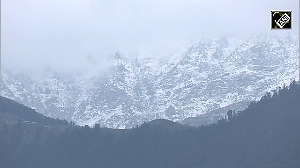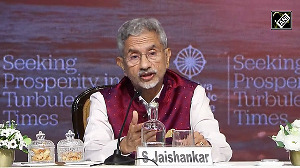
The 'Paradise on Earth' -- as the Mughal Emperor Jehangir described Kashmir -- used to be a tourist's delight, a honeymooners' paradise and a huge favourite of Bollywood directors.
But since 1989 the snowy mountains of Kashmir -- the land of Sufi culture with a very long history -- turned red with the rise of militancy, and the paradise turned into hell.
The cult of the 'bomb and gun' caught hold of the Kashmir valley by early 1990s followed by a mass exodus of Kashmiri Pandits from the valley. Terrorist violence in Kashmir over a decade led to the collapse of civil society.
Terrorism strikes in Jammu and Kashmir
The Kashmir conflict has sired a generation that has grown up in fear, tears and hate. The young minds in Kashmir have been trapped emotionally, psychologically and forcefully in the web of terrorism. An entire generation has lost out on growth and development.
With the cease-fire of 2003 the guns have fallen silent across the Line of Control. People in Kashmir have now realised that 'batchit (dialogue) se hi Kashmir ka masla hal ho sakta hai, iseliye batchit jari rakhni chahiye. Hum to bas aman chahtyee hai. (Only dialogue can resolve the Kashmir issue. Therefore talks must go on. We only want peace).'
The people have paid a heavy prize for 'Azad Kashmir', and have understood that not bloodshed but only peace can give way to peace. They are thus wholeheartedly supporting the confidence building measures between India and Pakistan.
The peace talks: complete coverage
The opening of the Srinagar-Muzzafarabad bus service (complete coverage) symbolises the end of an era of frozen relations between India and Pakistan and the beginning of a new era of hope.
Excited people are traveling aboard this bus today, and they hope other routes will be opened soon, including one directly to Lahore. These initiatives have generated a positive environment in Kashmir.
The central and state governments have also stepped up development of the region. The Kishen Ganga Power Project, Srinagar-Baramulla Railway and the international airport at Srinagar are a few examples of these combined efforts.
Tourism being the lifeline of the Kashmir economy, the state government is initiating plans to develop and strengthen the tourism sector. But closer examination of these plans indicate a lack of foresight.
No one can deny that tourism has increased since the peace talks began. But there are still a large number of people who remain apprehensive about visiting Kashmir.
To a certain extent, the media is responsible for this by focusing on the killings, bomb explosions and human rights violations by the paramilitary forces in Kashmir.
12 dead, 100 hurt in Pulwama blast
Rarely have the peace initiatives taken by women, youth or other organisations in Kashmir been dwelt upon. The Aman setu constructed within a short span by the Indian Army to link Pakistan occupied Kashmir and the Indian part of Kashmir, the Sadbhavna schools run by the Indian Army have never made a cover story.
The media needs to focus on the positive trends within Kashmiri society, in order to boost confidence among tourists wanting to visit Kashmir. In fact, tourism can be the best confidence building measure.
Unfortunately, the tourists who do visit Dal Lake on a weekend feel as if they have visited Mumbai's Juhu Beach. The lake is flooded with people till late evening, when it glitters like Mumbai's Queen's Necklace. The craze to stay in houseboats has increased so much that their rents have tripled.
The Gulmarg ski resort and its gondola, one of the highest ropeways in the world, is another big attraction for tourists, drawing nearly 4,000 visitors each day.
Kashmir is also a shopper's paradise. Unlike other hill stations, the markets here open around 8.30 in the morning, and remain open till late in the evening.
Smiling shopkeepers enthusiastically welcome the increasing number of tourists, so essential for their livelihood.
But a certain section of the people remain unhappy, believing they are not reaping the benefits. Both the state and local private transport operators complain their business has been hijacked by tour operators from outside the state.
Tourists visiting Kashmir need to understand certain dos and don'ts to avoid disappointment on arrival.
First and foremost, they need to realise that the tourism sector in Kashmir was almost closed down for 15 years.
Veteran Kashmiri tour operators like Raja Rani Travels continued to function even during the peak period of militancy, bringing in small groups of tourists since 1994. But they remained an exception.
There is also a lack of high class facilities for tourists. The Kashmir Hotel and Restaurant Association lacks hotels which can cater to foreign and domestic elite class tourists.
Safe Kashmir cries for tourists
Infrastructure and socio-economic development are also lacking. Long power cuts and bad roads are common. And unlike in other parts of India, in Kashmir you may not find a PCO/ STD center for miles.
When a landslide or an accident takes place on the Jammu-Srinagar road, people have to sometimes suffer for 16 to 17 hours as there is no alternative route and no wayside amenities. Hopefully, this problem will be reduced with the inauguration of the Jammu-Srinagar-Baramulla road.
The people in Kashmir say they have missed the bus of globalisation-liberalisation, and it will take time for them to make for the lost years. The valley's development is behind the rest of India by almost a decade.
Unable to generate the massive funding needed to provide A class tourist facilities, the state government has invited the private sector to play a role. But private investors appear reluctant to invest money, as they remain unsure about the stability of the state.
J&K identifies thrust areas, gets Rs 3 billion investment
The point is not how much investment is made but how it is made is more relevant. What is needed today is balanced investment across all sectors.
In a sign that the state government understands this, Chief Minister Mufti Muhammad Sayeed met with companies like Infosys and Reliance in Srinagar recently and invited them to set up offices in Kashmir, which will generate employment for educated local youth.
Higher education amongst girls is spreading fast and they are searching for new opportunities. With companies like Airtel launching operations in the valley, people are very happy since they not only provide alternative modes of communication but generate employment opportunities, particularly women who are marginalised in the tourism sector.
The people are in a mood to accept changes that will improve, strengthen and enhance the state's economy.
If the tourists are made aware of the socio-economic status of Kashmir today, it will help them understand the problem of Kashmir while enjoying its breathtaking beauty.
The government, on its part, needs to concentrate immediately on the following issues to make tourism industry in Kashmir vibrant again:
- Balanced investment in tourism sector.
- Both government and private sector should jointly evolve a comprehensive tourism policy.
- Investment in multiple sectors of agriculture, horticulture, food processing, handicrafts.
- Developing infrastructure facilities.
- Reduce troop concentration in the valley to avoid any adverse psychological impact on the tourism.
- Introduce low cost airlines to Kashmir.
- Bring out an effective marketing strategy to attract both domestic and foreign tourist.
- Strict vigilance or action against local touts harassing the tourists.
Above all, the government needs to maintain the ecological balance while developing tourism in Kashmir. For example, the amusement park in Pahalgam affects the basic aesthetic beauty of Kashmir.
The government needs to understand the basic difference between commercial tourism and eco-tourism. Kashmir is not like Dubai or Malaysia which invite commercial tourism and spoil the natural beauty of the place.
To emphasise this, some young people have formed a outfit called 'Better Kashmir,' which protested against the Pahalgam park and convinced the government to reconsider similar projects elsewhere in Kashmir.
The government also needs to check the rampant cutting down of trees -- some of them centuries old -- and the stone quarries that are cutting into the picturesque mountains.
The increase in tourism is thus a mixed blessing, since rampant development brings about serious environmental problems. The state government needs to find solutions to these problems
What attracts the tourists to Kashmir is the natural beauty of the valley. Its picturesque mountains and valleys are its strength, and if conserved and promoted, they will put Kashmir back on the world tourism map.
Rashmi Bhure is a senior lecturer in politics at SIES College, Bombay University. She visited Kashmir recently.





